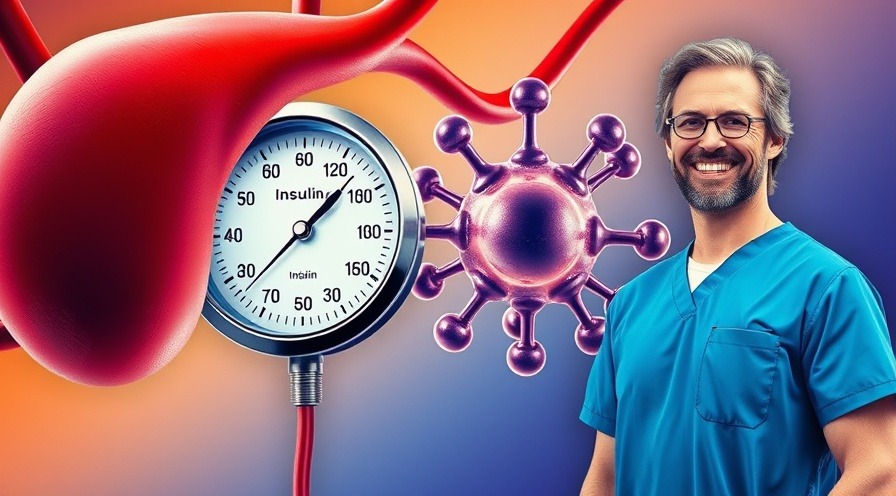
Understanding the Hidden Culprit Behind High Blood Pressure
For years, many of us have been conditioned to believe that salt is the primary enemy when it comes to high blood pressure. Yet, it looks like the real villain might be insulin resistance, a condition that largely flies under the radar in traditional medical discussions. Millions of individuals continue to struggle with hypertension even after adhering to the conventional advice of reducing salt intake and relying on medication. In reality, these treatments often address the symptom rather than the underlying cause.
In 'This Is Why Your Blood Pressure Is Still High — And It’s NOT Salt! Dr. Mandell', the discussion dives into the surprising truth about blood pressure management, exploring crucial insights that spark deeper analysis on our end.
The Connection Between Insulin Resistance and Blood Pressure
Insulin resistance occurs when the body's cells begin to ignore insulin, leading to excess insulin production. This condition is aggravated by frequent consumption of processed carbohydrates and sugars, such as pastries, white bread, pasta, and sugary beverages. Every time you consume these foods, your blood sugar spikes, and your pancreas releases more insulin to manage it. Unfortunately, this cycle can lead to high blood pressure as insulin has a glaring impact on cardiovascular health.
High insulin levels lead to increased sodium retention and blood volume, creating the potential for elevated blood pressure. Imagine a balloon filled with air. If you keep adding more air, it eventually bursts. Similarly, the tightness of our arteries can escalate when they’re filled with excess blood and become constricted due to insufficient nitric oxide production—a vital endothelial compound that facilitates blood vessel relaxation.
Rethinking Common Medical Approaches
Most traditional approaches focus on reducing blood pressure numbers through medications without investigating the metabolic imbalances at play. While medications can be a temporary solution, they fail to address insulin resistance, which needs to be tackled to achieve lasting improvements in blood pressure. The discussion around hypertension needs to evolve beyond just quick-fix pills.
Taking Back Control of Your Blood Pressure
Fortunately, reversing insulin resistance is a real possibility and can lead to significant improvements in blood pressure. Simple lifestyle changes can make a huge difference. Reducing processed sugars and refined carbohydrates is a great start. Instead, focus on incorporating clean proteins, healthy fats, and a variety of nutrient-dense vegetables that are rich in potassium and magnesium to nourish your body.
Hydration also plays a crucial role in regulating blood pressure. Studies show that proper hydration can improve blood flow and enhance cellular health, reducing insulin levels in the body. Even light physical activities, like brisk walking for just 15 to 20 minutes daily, can enhance insulin sensitivity.
The Importance of Sleep in Managing Blood Pressure
Quality sleep cannot be overstated when it comes to overall health, especially concerning blood pressure and insulin levels. Lack of sleep can elevate cortisol levels, leading to stress and inflammation that further worsen insulin resistance. To improve sleep hygiene, aim for regular sleep schedules, minimize screen time before bed, and practice relaxation techniques such as yoga or meditation to pave the way for restorative sleep.
Mindfulness and Emotional Wellness
Incorporating mindfulness practices can result in significant benefits for emotional health and stress reduction. Seniors may find practices like deep breathing, guided imagery, and even journaling contribute not only to better sleep but also foster resilience against chronic stressors that might contribute to both insulin resistance and high blood pressure.
Being socially connected also plays a vital role in mental wellness for older adults. Feelings of loneliness can lead to emotional health decline, impacting both mental and physical well-being. Engaging with friends and family can provide the support needed to actively combat unhealthy habits.
Your Next Steps Towards Better Health
To wrap it up, instead of merely chasing hypertension numbers, let’s shift our focus towards repairing the underlying metabolic dysfunction. It’s time to acknowledge that the traditional narrative is missing crucial elements in the dialogue around hypertension. Start by evaluating your daily diet, incorporate more wholesome foods, engage in physical activities, prioritize sleep, and build connections with others. You are not alone in this journey.
As Dr. Mandell encourages, it’s crucial to share this important message with those who might not be aware of the deeper links between insulin resistance and health issues. Providing others with this knowledge could change their lives—empowering them to take control of their health outcomes.
So, let’s embrace a holistic approach to health and let your body find its balance naturally.
 Add Element
Add Element  Add Row
Add Row 




Write A Comment